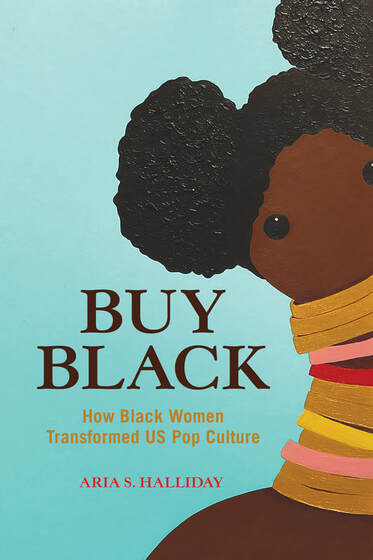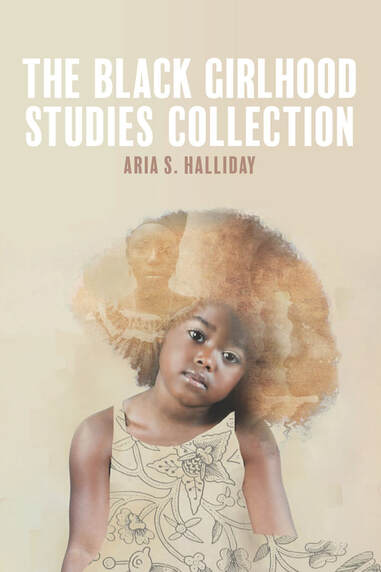books + research
Buy Black
How Black Women Transformed US Pop Culture
|
The Black Girlhood Studies Collection
|
RESEARCH
Dr. Halliday has made some of her most cited articles available for free download! Contact her directly for other articles.
The Power of Black Girl Magic Anthems: Nicki Minaj, Beyoncé, and “Feeling Myself” as Political Empowerment
| ||||||||||||||||||||
| Souls2018 w/ Nadia Brown: The Power of Black Girl Magic Anthems: Nicki Minaj, Beyoncé, and “Feeling Myself” as Political Empowerment | |
| File Size: | 354 kb |
| File Type: | |
Miley, What’s Good? Nicki Minaj’s Anaconda, Instagram Reproductions, and Viral Memetic Violence
Aria S. Halliday
Published in Girlhood Studies 11, no. 3 (Winter 2018): 67-83
Abstract:
Images on popular social media platforms like Instagram and Twitter that are the most entertaining are loaded with memetic power because their value is based on cultural attitudes that already constitute our lives in the everyday. Focusing on memes appropriating the artwork from Nicki Minaj’s single, Anaconda, I explore how popular memetic culture is fueled by Black women’s creativity yet positions Black women’s bodies as the fodder for potent viral images on social media platforms and in everyday experiences; Black girlhoods, at this level of representation and in lived experiences, are rarely awarded the distinction from womanhood that many other girlhoods enjoy. Thus, Black feminist discourses of desire which speak to both girlhoods and womanhoods inform my argument that social media has become a site of reproduction and consumption—a technological auction block where Black women’s bodies, aesthetics, and experiences are vilified for viral enjoyment.
Images on popular social media platforms like Instagram and Twitter that are the most entertaining are loaded with memetic power because their value is based on cultural attitudes that already constitute our lives in the everyday. Focusing on memes appropriating the artwork from Nicki Minaj’s single, Anaconda, I explore how popular memetic culture is fueled by Black women’s creativity yet positions Black women’s bodies as the fodder for potent viral images on social media platforms and in everyday experiences; Black girlhoods, at this level of representation and in lived experiences, are rarely awarded the distinction from womanhood that many other girlhoods enjoy. Thus, Black feminist discourses of desire which speak to both girlhoods and womanhoods inform my argument that social media has become a site of reproduction and consumption—a technological auction block where Black women’s bodies, aesthetics, and experiences are vilified for viral enjoyment.
| GirlhoodStudies2018: Miley What's Good: Nicki Minaj’s Anaconda, Instagram Reproductions, and Viral Memetic Violence | |
| File Size: | 102 kb |
| File Type: | |
Envisioning Black Girl Futures Nicki Minaj’s Anaconda Feminism and New Understandings of Black Girl Sexuality in Popular Culture
Aria S. Halliday
Published in Departures in Critical Qualitative Research, Vol. 6, Number 3 (2017)
Abstract:
Black girlhood exists in a world that is constantly trying to negate it. Black vernacular traditions, too, allow girls to be considered “fast” or “womanish” based on their perceived desire or sexuality. However, Black girlhood studies presents a space where Black girls can claim their own experiences and futures. This essay engages how Nicki Minaj’s “Anaconda” is fertile ground to help demystify Black girls’ possibilities for finding sexual pleasure and self- determination. Using hip-hop feminism, I argue that “Anaconda” presents a Black feminist sexual politics that encourages agency for Black girls, providing a “pinkprint” for finding pleasure in their bodies.
Black girlhood exists in a world that is constantly trying to negate it. Black vernacular traditions, too, allow girls to be considered “fast” or “womanish” based on their perceived desire or sexuality. However, Black girlhood studies presents a space where Black girls can claim their own experiences and futures. This essay engages how Nicki Minaj’s “Anaconda” is fertile ground to help demystify Black girls’ possibilities for finding sexual pleasure and self- determination. Using hip-hop feminism, I argue that “Anaconda” presents a Black feminist sexual politics that encourages agency for Black girls, providing a “pinkprint” for finding pleasure in their bodies.
| DCQR2017: Envisioning Black Girl Futures: Nicki Minaj's Anaconda Feminism and Black Girl Sexuality | |
| File Size: | 137 kb |
| File Type: | |
|

